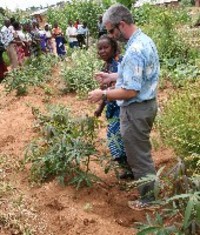 “We don’t need to lose people to AIDS.” Dr. Andy Gaston’s voice cracked slightly as he spoke during a PowerPoint presentation on the Livingstonia Synod AIDS Program (LISAP). He pointed to a picture of a friend and colleague who had died despite the best efforts of the caregivers. Treatment had been provided, including ARVs, but to no avail. Perhaps the treatment had begun too late. But for whatever reason or reasons, the man had died. “It shouldn’t be happening.”
“We don’t need to lose people to AIDS.” Dr. Andy Gaston’s voice cracked slightly as he spoke during a PowerPoint presentation on the Livingstonia Synod AIDS Program (LISAP). He pointed to a picture of a friend and colleague who had died despite the best efforts of the caregivers. Treatment had been provided, including ARVs, but to no avail. Perhaps the treatment had begun too late. But for whatever reason or reasons, the man had died. “It shouldn’t be happening.”
Supported by the Presbyterian Church (U.S.A.) and other churches and organizations, LISAP works so that such deaths do not occur. Andy serves as the director of LISAP, which works out of Ekwendeni a mission station that includes a school and hospital. There are three regional offices with coordinators.
The holistic ministry of LISAP includes many dimensions:
Home Based Care (HBC). Volunteers receive a basic two-week training to equip them to care for terminally ill patients. HBC patients can be young or old. In some cases patients are older women, who have been “orphaned” by the deaths of their children. Care providers receive a kit with supplies that have been purchased in Malawi.
Dietary Help. Recognizing the importance of a healthy diet to living with HIV/AIDS and to the effectiveness of ARVs, periodic food distributions are made and gardening assistance is provided.
Community Based Child Care (CBCC). Assistance is provided to start village nurseries that provide children with basic education and a nourishing meal. CBCCs also provide a respite for the children’s primary care providers. All children, not just orphans, are welcomed at the CBCCs. This serves a socializing function and helps address issues of stigma. LISAP has started 30 nurseries across Malawi.
Christian Camps. These camps provide an opportunity for older orphans to reflect upon life and faith. At the end of one camp, a young woman said that here experience taught her, “The Bible is a book for us. It’s not just a book for the minister at the front of the sanctuary.”
Prevention and Behavior Change. Several projects work with different groups of people to encourage sexual practices and behavior that lessen the spread of HIV/AIDS. Members of congregations are trained as marriage counselors to help families. People with HIV/AIDS are trained as counselors for others.
Income Generation Project. In the last two years, a pilot microfinance project has been launched. Village savings and loans groups are created that impact household, reduce levels of transactional sex, and strengthen marriages. Individuals, 80% of whom are women, are brought together to create groups in which they save shares. Shares are priced quite reasonably—between 20 and 50 kwacha (roughly 14 to 35 cents). Members buy between one and five shares a week. There is a limit to the number of shares one person can buy. The price is such that every person can participate. When the capital reaches a certain level, the group begins making loans to each other. The result is that women are no longer as financially dependent on men.
Youth Programmes. Youth development projects focus on older children, often orphans, who have limited possibilities for employment. In one area, youth have been helped to create a piggery to experience raising pigs. Vocational training has taught youth skills in the areas of bricklaying and tinsmithing. Tailoring and bicycle repair projects are planned for the future. Youth projects also focus on HIV/AIDS education through traditional dancing and drama.
Our day on Monday, March 3 opened with Dr. Andy Gaston’s overview of LISAP’s ministries. Travel/study seminar participants then divided into two groups to go and see examples of these ministries.
Photo of Andy Gaston in the garden at the Kaphuta Presbyterian Church by Kyle Kittrell.